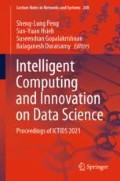Abstract
In the human body, the brain is the most central and multi-faceted organ. It is built up of more than 100 billion nerves that can communicate with trillions of associations in the human body. In a recent technology scenario, numerous efforts and promising results are obtained in healthcare systems. The brain tumor is the most complex and challenging disease and cannot get a cure quickly. The two forms of brain tumor are benign and malignant. The most distressing state of the tumor is malignant, whose patient survival rate is still tricky. Malignant happens because the brain is a critical and complex part of the body. Early detection and diagnosis of tumors increase the patient’s survival rate. Distinct techniques and algorithms have been developed to detect and diagnose the tumor. However, still, it is a challenging task to recognize and predict in earlier stages accurately. This article represents a new methodology to handle the challenges that occur during brain tumor detection using machine learning algorithms. The problems of brain tumor identification and evaluation have been addressed in the study. It is time-consuming to limit the current system, and the accuracy is not efficient. In the proposed treatment model, the random forest classifier technique identifies the tumor with measured precision in less machine time. Our findings concluded that the proposed system has a high tumor detection accuracy rate, disease diagnosis rate, and disease diagnosis time has been measured in less computational time for tumor detection.
Access this chapter
Tax calculation will be finalised at checkout
Purchases are for personal use only
References
Grundy R, Walker D (2010) Brain and spinal tumours: contemporary challenges in clinical practice. Paediatr Child Health 20(3):117–122
Lyon JG, Mokarram N, Saxena T, Carroll SL, Bellamkonda RV (2017) Engineering challenges for brain tumour immunotherapy. Adv Drug Deliv Rev 114:19–32
Tandel GS, Biswas M, Kakde OG, Tiwari A, Suri HS, Turk M, …, Madhusudhan BK (2019) A review on a deep learning perspective in brain cancer classification. Cancers 11(1):111
Amin J, Sharif M, Raza M, Saba T, Anjum MA (2019) Brain tumour detection using statistical and machine learning method. Comput Methods Programs Biomed 177:69–79
Hussain L, Saeed S, Awan IA, Idris A, Nadeem MSA, Chaudhry QUA (2019) Detecting brain tumour using machines learning techniques based on different features extracting strategies. Curr Med Imaging 15(6):595–606
Hatami T, Hamghalam M, Reyhani-Galangashi O, Mirzakuchaki S (2019) A machine learning approach to brain tumours segmentation using adaptive random forest algorithm. In: 2019 5th Conference on knowledge-based engineering and ınnovation (KBEI), pp 076–082. IEEE
Ker J, Bai Y, Lee HY, Rao J, Wang L (2019) Automated brain histology classification using machine learning. J Clin Neurosci 66:239–245
Aldape K, Brindle KM, Chesler L, Chopra R, Gajjar A, Gilbert MR, …, Jones DT (2019) Challenges to curing primary brain tumours. Nat Rev Clin Oncol 16(8):509–520
Bonte S, Goethals I, Van Holen R (2018) Machine learning-based brain tumour segmentation on limited data using local texture and abnormality. Comput Biol Med 98:39–47
Zhang L, Zhang H, Rekik I, Gao Y, Wang Q, Shen D (2018) Malignant brain tumor classification using the random forest method. In: Joint IAPR ınternational workshops on statistical techniques in pattern recognition (SPR) and structural and syntactic pattern recognition (SSPR), pp 14–21. Springer, Cham
Lefkovits L, Lefkovits S, Vaida MF (2016) Brain tumour segmentation based on random forest. Mem Sci Sections Rom Acad 39(1):83–93
Soltaninejad M, Zhang L, Lambrou T, Yang G, Allinson N, Ye X (2019) MRI brain tumor segmentation using random forests and fully convolutional networks. arXiv:1909.06337
Doss S, Paranthaman J, Gopalakrishnan S, Duraisamy A, Pal S, Duraisamy B, …, Le DN (2021) Memetic optimization with cryptographic encryption for secure medical data transmission in IoT-based distributed systems. CMC-Comput Mater Contınua 66(2):1577–1594
Manikandan P, Sekaran R, Suseendran G, Jabeen TN, Raveendran AP, Manikandan R (2020) An efficient detection and segmentation of brain tumor using robust active shape model. J Crit Rev 7(9):2020
Gupta D, Ahmad M (2018) Brain MR image de-noising based on wavelet transform. Int J Adv Technol Eng Explor 5(38):11–16
Kumar A, Manikandan R (2020) Recognition of brain tumour using fully convolutional neural network-based classifier. In: International conference on ınnovative computing and communications, pp 587–597. Springer, Singapore
Kumar A, Manikandan R, Rahim R (2020) A study on brain tumour detection and segmentation using deep learning techniques. J Comput Theor Nanosci 17(4):1925–1930
Author information
Authors and Affiliations
Editor information
Editors and Affiliations
Rights and permissions
Copyright information
© 2021 The Author(s), under exclusive license to Springer Nature Singapore Pte Ltd.
About this paper
Cite this paper
Magesh, S., Niveditha, V.R., Kumar, A., Manikandan, R., Rajakumar, P.S. (2021). Comparative Study on Challenges and Detection of Brain Tumor Using Machine Learning Algorithm. In: Peng, SL., Hsieh, SY., Gopalakrishnan, S., Duraisamy, B. (eds) Intelligent Computing and Innovation on Data Science. Lecture Notes in Networks and Systems, vol 248. Springer, Singapore. https://doi.org/10.1007/978-981-16-3153-5_4
Download citation
DOI: https://doi.org/10.1007/978-981-16-3153-5_4
Published:
Publisher Name: Springer, Singapore
Print ISBN: 978-981-16-3152-8
Online ISBN: 978-981-16-3153-5
eBook Packages: Intelligent Technologies and RoboticsIntelligent Technologies and Robotics (R0)

